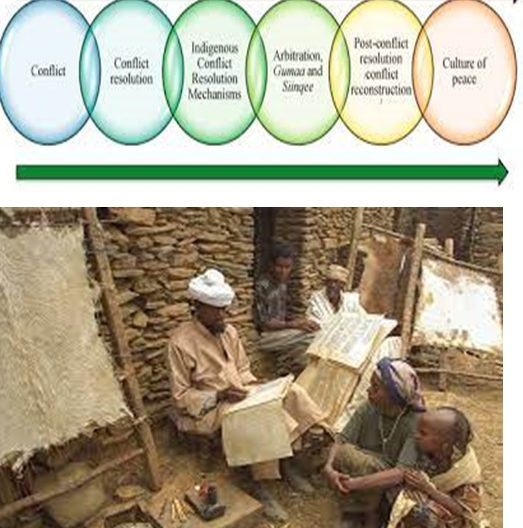
Ethiopia is a country rich in different indigenous knowledge and cultural values that have crucial importance in solving national problems, sustaining peace, unity and solidarity among different ethnic groups, in nation building and advancing the overall development of the country as well as being used as a basis for the development of science and technology.
Among the indigenous knowledge and practices that our country is known for are traditional medicines, natural resources and environment preservation and conservation methods, conflict management systems, customary dispute resolution and reconciliation mechanisms, and traditional governance systems.
These indigenous knowledge and cultural values that pass down from generation to the next orally or in written form have been exercised among the community for long in several different ways and at different contexts. As a result, in most cases, they have proved to be relevant in various occasions and incidents.
Mainly, Ethiopia’s traditional conflict resolution mechanisms are more influential, effective and vital instruments in resolving conflicts, rebuilding fractured relationships, and bringing about reconciliation between and among conflicting parties.
That is why it is said that deploying Ethiopia’s conflict resolution mechanisms which have been developed and practiced by different ethnic groups in different situations are beneficial to arrest the country’s long-lasting disagreements and inconveniences.
The Ethiopian National Dialogue Commission also emphasizes the central roles that the traditional conflict resolution mechanisms play in identifying the root causes of differences and promoting reconciliation, reinforcing social cohesion, peace and unity. It has also stated that it will apply indigenous knowledge in its discussion process.
As to the Commission, since indigenous knowledge and conflict resolution mechanisms have been developed and exercised by the community for decades, the people feel ownership to these norms, respected them; which in turn play a significant role in bringing about peace and improving social interaction among citizens. Most of all, for the reason that, the customary dispute resolution mechanisms involve the process of identifying root causes of the disputes, arbitration between wrongdoers and victims parties, as well as compensate the preys, it is acceptable by all.
However, despite the fact that these age long knowledge and practices have enormous advantages, there are still huge gaps in terms of integrating indigenous knowledge and values with modern knowledge.
A recent workshop that was held for three consecutive days in Jinka University also accentuated the multitudinous benefits of Ethiopia’s indigenous knowledge and the immense role it can play in governance, scientific discoveries in addition to resolving conflicts and sustaining peace, and strengthening social cohesion.
Speaking at the workshop, organized focusing on culture and history, California University Anthropologist Prof. Donham said that indigenous knowledge plays huge role in the development of both in modernizing governance and scientific discoveries,
According to Prof. Donham who also conducted a number of studies regarding African indigenous knowledge, including Ethiopia, the country has a remarkable wealth of indigenous knowledge and cultures. As he stated, most of his research and study years have been dedicated to Ethiopia, and he believes that the country is endowed with beautiful landscapes and diverse cultures.
The professor also underscored the power of traditional conflict resolution methods embedded within indigenous knowledge to resolve conflicts, foster solidarity and promote lasting peace and development.
The paper presented by Prof. Donham under the title “Ethiopia’s Foundation and Indigenous Knowledge for Conflict Resolution,” emphasizes the role of multi-culture and multiple identities for the emergence of the new Ethiopia.
He explored the critical role indigenous knowledge from various cultures plays in shaping modern governance and scientific discoveries in Ethiopia.
Professor Donham finally called on universities and research institutions to actively develop and integrate these valuable systems into modern governance practices and the advancements of Ethiopia’s scientific research and technological innovation for economic prosperous
Prof. Donham, with over five decades of research activities across Africa, including Ethiopia, has published books on sociological and political issues, ENA reported.
On his part Jinka University Academic Vice President, Elias Alemu (PhD) stated the aim of the workshop. According to him, the workshop aimed at fostering collaboration between historians and social scientists.
He also said that the gathering would serve as a catalyst for universities and research institutes, both within and beyond Ethiopia’s borders, to work together in research endeavors.
Lecturer at Hawassa University Social Anthropology, Hanna Getachew, on her part stressed the importance of the workshop in fostering a global exchange of knowledge and experience. Emphasizing the need for social scientists to transcend disciplinary boundaries, Hanna urged researchers to delve into diverse cultures and unearth the wealth of most important, yet often forgotten, values embedded within them, she concluded.
It is common knowledge that indigenous knowledge and cultural values have tremendous contributions in terms of addressing societal problems, strengthening social interaction and fostering unity and solidarity.
Aside from these, their contribution to ensure sustainable peace and development, advance research and innovation, preserve and conserve natural resources and the environment, is huge.
Needless to say that conflict is an inevitable phenomenon; especially, in a diverse country where different ethnic groups with their own different languages, unique religions, cultural values, norms and practices are living together.
Due to this and other important reasons, these days, there is a growing interest among countries across the world to exploit indigenous knowledge and social values to resolve challenges and realize sustainable peace and development.
Ethiopia, as a country where indigenous knowledge and traditional values are still alive and entertained among some communities, can benefit a lot by making use of them properly and meaningfully, in a manner benefitting the community. In this regard, integrating this unique knowledge and cultural values with the modern ones and exploiting them accordingly have wide ranging benefits.
BY STAFF REPORTER
THE ETHIOPIAN HERALD FRIDAY 10 MAY 2024





